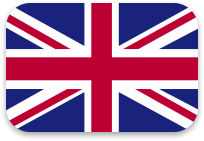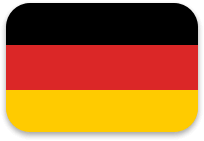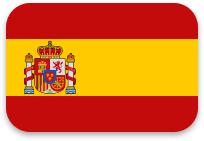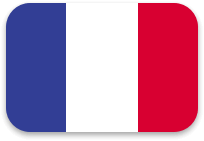Picture yourself at a small farmer’s market in the north of Italy. You’re relatively comfortable with your level of Italian, and you confidently say, “Un cavallo, per favore!” Suddenly, the person behind the vegetables starts laughing. You realize you just asked for a horse - "cavallo," not cabbage-"cavolo." This amusing story is one of the many anecdotes travelers experience, especially those from an English-speaking country. Common pitfalls include confusing similar words or translating English phrases and expressions word for word.
Learn essential travel expressions for your target destination to minimize unpleasant surprises abroad.
Greetings and Introductions
Even if you are greeted in English, it’s flattering to locals if you try to use a few phrases in their language. It shows respect and adds a personal touch to your interactions. So, next time you're abroad, impress your new connections with a few words in their native language.
| English | German | French | Italian | Spanish |
|---|---|---|---|---|
| Good morning | Guten Morgen | Bonjour | Buongiorno | Buenos días |
| Goodbye | Auf Wiedersehen | Au revoir | Arrivederci | Adiós |
| How are you | Wie geht es Ihnen? | Comment allez-vous? | Come sta? | ¿Cómo está usted? |
| Nice to meet you | Freut mich | Enchanté(e) | Piacere | Mucho gusto |
| What is your name? | Wie heißt du? | Comment vous appelez-vous? | Come ti chiami? | ¿Cómo te llamas? |
| Excuse me! | Entschuldigung! | Excusez-moi! | Scusa! | ¡Disculpe! |
| Can you help me? | Können Sie mir helfen? | Pouvez-vous m'aider? | Puoi aiutarmi? | ¿Puede ayudarme? |
| Please | Bitte | S'il vous plaît | Per favore | Por favor |
| Thank you! | Danke! | Merci! | Grazie! | ¡Gracias! |
| Yes | Ja | Oui | Sì | Sí |
| No | Nein | Non | No | No |
| See you later | Bis später | À plus tard | A più tardi | Hasta luego |
Making Reservations
Meticulous planning reduces the risk of catching a cold while waiting for a bus or getting left behind in a group of tourists. Confirm your reservations and specify the most important details to avoid unpleasant surprises.
| English | German | French | Italian | Spanish |
|---|---|---|---|---|
| I would like to book a room for two nights. | Ich möchte ein Zimmer für zwei Nächte buchen. | Je voudrais réserver une chambre pour deux nuits. | Vorrei prenotare una stanza per due notti. | Quisiera reservar una habitación por dos noches. |
| Internet access | Internetzugang | Accès à Internet | Accesso a Internet | Acceso a Internet |
| Wi-fi password | Wi-Fi-Passwort | Mot de passe Wi-Fi | Password Wi-Fi | Contraseña de Wi-Fi |
| Double room | Doppelzimmer | Chambre double | Camera matrimoniale | Habitación doble |
| Room service | Zimmerservice | Service en chambre | Servizio in camera | Servicio de habitaciones |
| Food allergy | Nahrungsmittelallergie | Allergie alimentaire | Allergia alimentare | Alergia alimentaria |
| Vegetarian dishes | Vegetarische Gerichte | Plats végétariens | Piatti vegetariani | Platos vegetarianos |
At the Airport & on the Plane

Travel agents and flight attendants typically speak English proficiently. Nonetheless, knowing some useful phrases in a foreign language can be helpful, especially if you have multiple layovers or a multi-city itinerary. Additionally, engaging in small talk with native speakers heading back home can make a long flight over the ocean seem much shorter.
| English | German | French | Italian | Spanish |
|---|---|---|---|---|
| Where is the check-in counter? | Wo ist der Check-in Schalter? | Où est le comptoir d'enregistrement? | Dove si trova il banco di check-in? | ¿Dónde está el mostrador de facturación? |
| Boarding pass | Bordkarte | Carte d'embarquement | Carta d'imbarco | Pase de abordar |
| One-way ticket | Einfache Fahrt | Billet aller simple | Biglietto di sola andata | Billete de ida |
| Round-trip ticket | Hin- und Rückflugticket | Billet aller-retour | Biglietto di andata e ritorno | Billete de ida y vuelta |
| Tray table | Klapptisch | Tablette rabattable | Travolino | Bandeja |
| Could I have a window seat, please? | Könnte ich bitte einen Fensterplatz bekommen? | Pourrais-je avoir un siège côté fenêtre, s'il vous plaît? | Potrei avere un posto finestrino, per favore? | ¿Podría tener un asiento junto a la ventana, por favor? |
| Can I have an aisle seat, please? | Kann ich bitte einen Gangplatz bekommen? | Puis-je avoir un siège côté couloir, s'il vous plaît? | Posso avere un posto vicino al corridoio, per favore? | ¿Podría tener un asiento de pasillo, por favor? |
| I'd like to change my seat. | Ich möchte meinen Sitzplatz ändern. | Je voudrais changer de siège. | Vorrei cambiare il mio posto. | Me gustaría cambiar mi asiento. |
| What's the departure time? | Wann ist die Abflugzeit? | Quelle est l'heure de départ? | Qual è l'orario di partenza? | ¿Cuál es la hora de salida? |
| Could I have a blanket, please? | Könnte ich bitte eine Decke haben? | Pourrais-je avoir une couverture, s'il vous plaît? | Potrei avere una coperta, per favore? | ¿Podría tener una manta, por favor? |
| Baggage claim area | Gepäckausgabe | Zone de récupération des bagages | Area ritiro bagagli | Zona de recogida de equipaje |
| Can I have another pillow? | Kann ich noch ein Kissen haben? | Puis-je avoir un autre oreiller? | Posso avere un altro cuscino? | ¿Puedo tener otra almohada? |
| How long is the layover? | Wie lange dauert der Zwischenstopp? | Combien de temps dure l'escale? | Quanto dura la sosta? | ¿Cuánto tiempo es la escala? |
| What's the inflight entertainment? | Was gibt es an Bord zu unterhalten? | Quels sont les divertissements à bord? | Quali sono le opzioni di intrattenimento? | ¿Qué hay de entretenimiento a bordo? |
| Can I get a vegetarian meal? | Kann ich ein vegetarisches Essen bekommen? | Puis-je avoir un repas végétarien? | Posso avere un pasto vegetariano? | ¿Puedo tener una comida vegetariana? |
Asking for Directions

Using English phrases and expressions may not be enough abroad. Of course, when talking with a flight attendant or at the hotel front desk, you will get your message across by speaking English only. However, there may be times when you rely on locals for directions. Whether searching for the nearest drugstore, a train station, or good restaurants, asking locals can be a time-saving strategy. Find below some everyday travel English phrases and their equivalents.
| English | German | French | Italian | Spanish |
| Can you tell me how to get to...? | Können Sie mir sagen, wie ich nach...komme? | Pouvez-vous me dire comment aller à...? | Può dirmi come arrivare a...? | ¿Puede decirme cómo llegar a...? |
| Excuse me, where is...? | Entschuldigung, wo ist...? | Excusez-moi, où est...? | Scusa, dov'è...? | Disculpe, ¿dónde está...? |
| How do I get to...from here? | Wie komme ich von hier aus nach...? | Comment puis-je aller à...à partir d'ici? | Come faccio ad arrivare a...da qui? | ¿Cómo llego a...desde aquí? |
| Is it far from here? | Ist es weit von hier? | Est-ce loin d'ici? | È lontano da qui? | ¿Está lejos de aquí? |
| Can you show me on the map? | Können Sie mir das auf der Karte zeigen? | Pouvez-vous me montrer sur la carte? | Può mostrarmelo sulla mappa? | ¿Puede mostrarme en el mapa? |
| Which way is...? | Welche Richtung ist...? | Dans quelle direction se trouve...? | In quale direzione si trova...? | ¿En qué dirección está...? |
| Do you know where...is? | Wissen Sie, wo...ist? | Savez-vous où se trouve...? | Sa dov'è…? | ¿Sabe dónde está...? |
| Can you tell me how to get to...? | Können Sie mir sagen, wie ich nach...komme? | Pouvez-vous me dire comment aller à...? | Può dirmi come arrivare a...? | ¿Puede decirme cómo llegar a...? |
| Where is the nearest currency exchange? | Wo ist der nächste Geldwechsel? | Où est le bureau de change le plus proche? | Dov'è il cambiavalute più vicino? | ¿Dónde está el cambio de divisas más cercano? |
| Public transportation | Öffentlicher Verkehr | Transports public | Transporto pubblico | Transporte público |
| Where is the bus stop/train station? | Wo ist die Bushaltestelle/der Bahnhof? | Où est l'arrêt de bus/la gare? | Dov'è la fermata dell'autobus/la stazione? | ¿Dónde está la parada de autobús/la estación de tren? |
| One ticket to..., please. | Ein Ticket nach..., bitte. | Un billet pour..., s'il vous plaît. | Un biglietto per..., per favore. | Un billete para..., por favor. |
| When is the next bus/train? | Wann fährt der nächste Bus/Zug? | Quand est le prochain bus/train? | Quando parte il prossimo autobus/treno? | ¿Cuándo sale el próximo autobús/tren? |
| How much is a ticket to...? | Wie viel kostet ein Ticket nach...? | Combien coûte un billet pour...? | Quanto costa un biglietto per...? | ¿Cuánto cuesta un billete a...? |
| Does this bus/train go to...? | Fährt dieser Bus/Zug nach...? | Est-ce que ce bus/train va à...? | Questo autobus/treno va a...? | ¿Este autobús/tren va a...? |
| How many stops until...? | Wie viele Haltestellen bis...? | Combien d'arrêts jusqu'à...? | Quante fermate fino a...? | ¿Cuántas paradas hasta...? |
Speak a new language with confidence!
Build fluency faster with FunEasyLearn — just 10 minutes a day is enough to make real progress.
Ordering Food

Discover the heart of a destination through its local cuisine. Savor the sizzle of a German Bratwurst, indulge in the elegance of French wine and croissants. Relish the authenticity of Italian pizza and tiramisu, or explore the vibrant flavors of Spanish tapas or churros. From street food to Michelin-starred dishes, your gastronomic journey awaits. Enjoy a fine dining experience or street food by communicating your preferences.
| English | German | French | Italian | Spanish |
|---|---|---|---|---|
| I'll have the [dish name], please. | Ich hätte gerne [dish name], bitte. | Je vais prendre [dish name], s'il vous plaît. | Prenderò [dish name], per favore. | Voy a tomar [dish name], por favor. |
| What do you recommend? | Was empfehlen Sie? | Qu'est-ce que vous recommandez ? | Cosa mi consiglia? | ¿Qué me recomienda? |
| What's popular here? | Was ist hier beliebt? | Qu'est-ce qui est populaire ici ? | Cosa è popolare qui? | ¿Qué es popular aquí? |
| Do you have any vegan options? | Haben Sie vegane Optionen? | Avez-vous des options végétaliennes ? | Avete opzioni vegane? | ¿Tienen opciones veganas? |
| Could you tell me what's in the [dish name]? | Können Sie mir sagen, was im [dish name] ist? | Pourriez-vous me dire ce qu'il y a dans le [dish name] ? | Potrebbe dirmi cosa c'è nel [dish name]? | ¿Podría decirme qué hay en el [dish name]? |
| Is this dish spicy? | Ist dieses Gericht scharf? | Ce plat est-il épicé ? | Questo piatto è piccante? | ¿Este plato es picante? |
| What are the main course specials? | Was sind die Hauptgericht-Spezialitäten? | Quels sont les plats principaux du jour ? | Quali sono le specialità per il secondo piatto? | ¿Cuáles son los platos principales del día? |
| I'm interested in trying your signature/main course dishes. | Ich würde gerne Ihre Signature/Hauptgerichte probieren. | Je suis intéressé(e) par vos plats principaux/signature. | Sono interessato/a a provare i vostri piatti principali/firma. | Estoy interesado en probar sus platos principales/firma. |
Shopping and Sightseeing

It would be a pity to miss out on the best spots for shopping and local sights. The phrases below are perfect for people on a shopping spree, tourists looking for vacation souvenirs, and curious travelers.
| English | German | French | Italian | Spanish |
| How much does this cost? | Wie viel kostet das? | Combien ça coûte? | Quanto costa? | ¿Cuánto cuesta esto? |
| Do you accept credit cards? | Akzeptieren Sie Kreditkarten? | Acceptez-vous les cartes de crédit? | Accettate carte di credito? | ¿Aceptan tarjetas de crédito? |
| Can I try it on? | Kann ich es anprobieren? | Puis-je l'essayer? | Posso provarlo? | ¿Puedo probármelo? |
| Do you have a fitting room? | Haben Sie eine Umkleidekabine? | Avez-vous une cabine d'essayage? | Avete un camerino? | ¿Tienen un probador? |
| Are there any sales or promotions happening? | Gibt es gerade Sonderangebote oder Aktionen? | Y a-t-il des soldes ou des promotions en cours? | Ci sono vendite o promozioni in corso? | ¿Hay alguna venta o promoción en este momento? |
| Do you have this in another size/color? | Haben Sie das in einer anderen Größe/Farbe? | Avez-vous cela dans une autre taille/couleur? | Avete questo in un'altra taglia/colore? | ¿Tienen esto en otro tamaño/color? |
| Is there an entrance fee? | Gibt es Eintrittsgeld? | Y a-t-il un frais d'entrée? | C'è un costo d'ingresso? | ¿Hay algún costo de entrada? |
| Are there guided tours available? | Gibt es geführte Touren? | Y a-t-il des visites guidées disponibles? | Ci sono visite guidate disponibili? | ¿Hay tours guiados disponibles? |
| Is photography allowed? | Ist Fotografieren erlaubt? | La photographie est-elle autorisée? | Si può fotografare? | ¿Está permitida la fotografía? |
| Are there any restrictions on taking pictures? | Gibt es Einschränkungen beim Fotografieren? | Y a-t-il des restrictions sur la prise de photos? | Ci sono restrizioni sul fare fotografie? | ¿Hay restricciones para tomar fotografías? |
| Can we book tickets in advance? | Können wir Tickets im Voraus buchen? | Pouvez-vous réserver des billets à l'avance? | Possiamo prenotare i biglietti in anticipo? | ¿Podemos reservar entradas con anticipación? |
| Do you provide audio guides? | Bieten Sie Audioguides an? | Fournissez-vous des audioguides? | Fornite audioguide? | ¿Proporcionan guías de audio? |
| Is there a group discount? | Gibt es einen Gruppenrabatt? | Y a-t-il un tarif de groupe? | C'è uno sconto di gruppo? | ¿Hay descuentos para grupos? |
| Is there an English audio guide available? | Gibt es einen englischen Audioguide verfügbar? | Y a-t-il un guide audio en anglais disponible? | C'è una guida audio in inglese disponibile? | ¿Hay una guía de audio en inglés disponible? |
Emergencies

Unexpected situations are bound to happen. Being prepared for emergencies, especially when traveling, is essential. The proverbial "better safe than sorry" makes sense, especially when you can prepare for the unexpected. Equip yourself with phrases to quickly solve an issue or help someone in need.
| English | German | French | Italian | Spanish |
|---|---|---|---|---|
| I need help! | Ich brauche Hilfe! | J'ai besoin d'aide! | Ho bisogno di aiuto! | ¡Necesito ayuda! |
| Call the police! | Rufen Sie die Polizei! | Appelez la police! | Chiamate la polizia! | ¡Llame a la policía! |
| Call an ambulance! | Rufen Sie einen Krankenwagen! | Appelez une ambulance! | Chiamate un'ambulanza! | ¡Llame a una ambulancia! |
| I need a doctor. | Ich brauche einen Arzt. | J'ai besoin d'un médecin. | Ho bisogno di un dottore. | Necesito un doctor. |
| I'm lost. | Ich habe mich verlaufen. | Je suis perdu(e). | Mi sono perso/a. | Estoy perdido/a. |
| There is a fire! | Es brennt! | Il y a un incendie! | C'è un incendio! | ¡Hay un incendio! |
| I need to contact my embassy. | Ich muss meine Botschaft kontaktieren. | Je dois contacter mon ambassade. | Devo contattare la mia ambasciata. | Necesito contactar con mi embajada. |
Addressing People - Cultural Notes
In German, French, Italian, and Spanish, it's important to be mindful of the two forms of address: formal and informal. Formal forms are used in professional settings and when addressing strangers for the first time. Switch to informally addressing them only if they ask you to. That will help you avoid a potentially negative reaction when interacting with the locals.
| German | French | Italian | Spanish | |
|---|---|---|---|---|
| Formal address for “you” | Sie | Vous | Lei | Usted |
| Informal address for “you” | Du | Tu | Tu | Tú |
Remember to observe social cues and follow the lead of the person you are speaking with to determine the appropriate form of address. Using the correct form of address demonstrates respect and politeness, which is highly valued in these cultures.
Prepare for Your Travels with FunEasyLearn
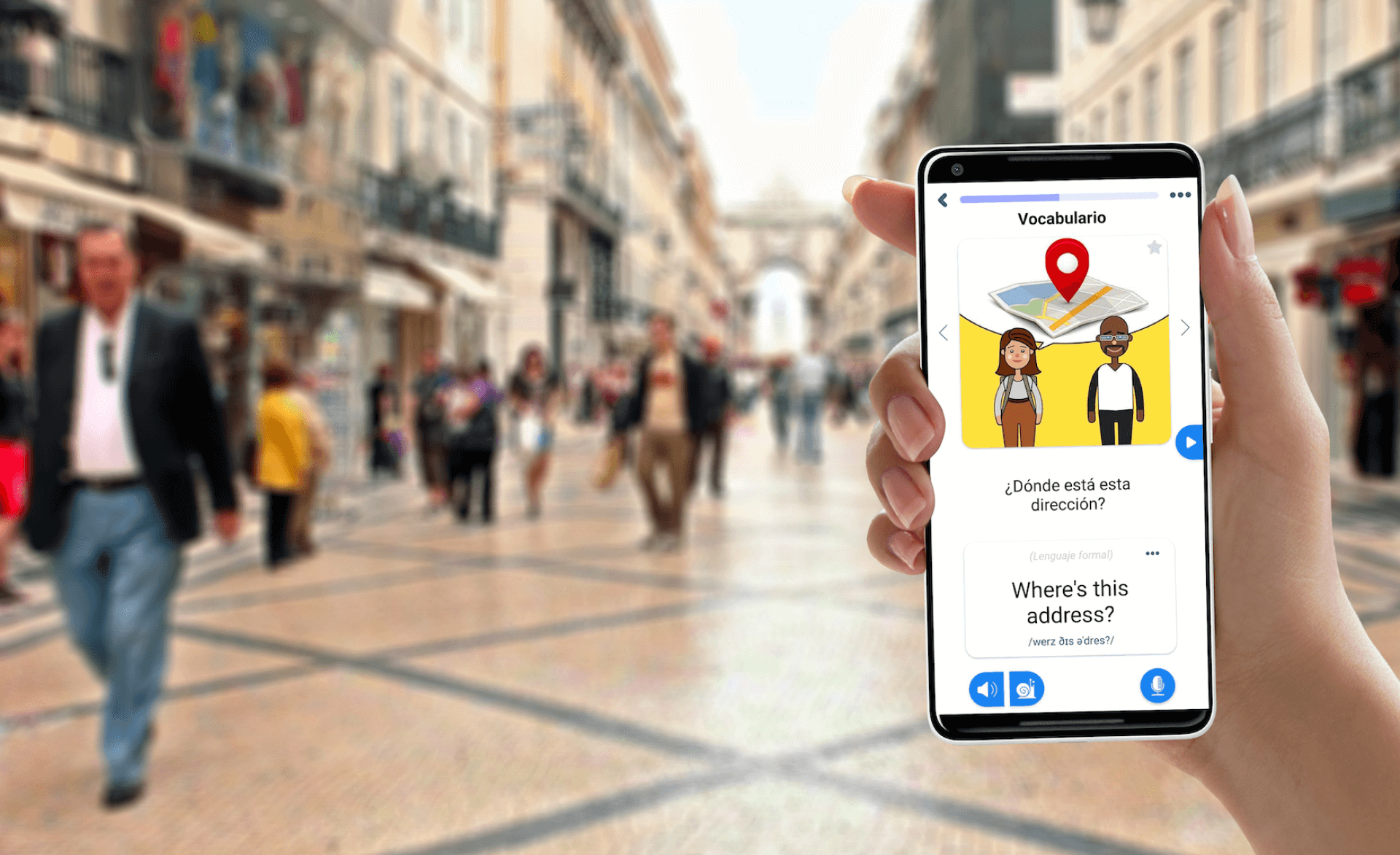
Are you planning a vacation somewhere interesting? Do you see yourself wandering around the busy streets of Paris or exploring the historic neighborhoods of Rome? FunEasyLearn can help you master essential phrases to get around and immerse yourself in the local culture.
Challenge: You’ve booked your tickets to your travel destination, but you don’t speak the local language.
Challenge: You want to keep your learning streak when on vacation.
Challenge: You want to learn a new language but are not ready to commit to a paid plan.
Final Thoughts
Traveling is great for your overall well-being. Even with a possible jet lag after a one-night flight across several time zones, uncovering a new country is well worth it. Learn the language of the locals to immerse yourself in a new culture and enjoy an unforgettable vacation.
Are you ready to make the most out of your vacation abroad?

